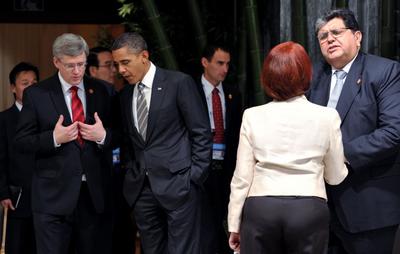This observation is starkest when it comes to Canada’s participation in the emerging Asian regional forums.
Now that the elections are over, the Harper government should take the chance to reconsider its policy toward the Asia-Pacific’s regional architecture. For Canada, the past several years have been a period of missed opportunities to participate in Asia’s evolving and changing regional arrangements.
Canada has been a dialogue partner of ASEAN since 1977 and is a founding member economy of APEC (which first met in 1989 to promote regional economic cooperation, especially trade liberalisation). Canada also played a major role in the creation of the ASEAN Regional Forum in 1994 as the region’s first multilateral security forum.
But things have been going downhill since. The new game in Asia is the East Asia Summit (EAS), established in Malaysia in 2005 to deal with Asia’s political, economic and strategic issues. In its original conception, the EAS consisted only of the 10 ASEAN countries plus China, Japan and South Korea; but later India, Australia and New Zealand were invited. Subsequently, after its establishment, the US and Russia were also able to join in 2010. The US in particular is seeking an active role in this forum.
Canada, therefore, is now the only major economy in the Asia-Pacific region omitted from the EAS. Canada is also excluded from the ASEAN Defence Ministers Meeting (ADMM) forum, which focuses on five areas of cooperation: disaster relief, counter-terrorism, maritime security, peacekeeping and military medicine. And while these are all core areas of security interest to Canada, Ottawa was not invited to the inaugural meeting of the expanded forum (ADMM Plus) in Hanoi last October. In contrast, Australia, China, India, Japan, South Korea, New Zealand, Russia and the US were all there.
Still, Canada has done some things right. In July 2010, it followed the lead of the US and other major powers in signing ASEAN’s Treaty of Amity and Cooperation and appointing an ambassador to ASEAN. This treaty is a prerequisite for participation in the East Asia Summit. Yet some suggest that Canada should instead focus its energies on the G20 — a global forum for key developed nations and emerging powers, which has proven its usefulness in the aftermath of the 2008 global financial crisis. G20 members, other than Canada, include China, India, Japan, Indonesia and South Korea. There have even been suggestions to convene a forum of all the Asia-Pacific members of the G20 (China, India, Japan, Indonesia and South Korea), along with the US, Australia and Canada.
But it would be a serious mistake for Canada to focus its time and energy on developing such an Asia-Pacific focused forum within the G20, and the G20 more generally, while giving short shrift to Asia-Pacific regional groups like the EAS. First, the G20’s legitimacy as a representative body of the international community is still questioned. Second, the argument that the G20 should stay focused on global financial and economic issues, rather than get involved in political and security matters, is persuasive. Introducing the latter would be too controversial, would intrude onto UN Security Council terrain, and would distract the G20 from its urgent task of global economic rebalancing. Third, such a policy would not be welcomed by many Asian countries, especially those who are not members of the G20.
Many of the 21st century’s most important countries are located in Asia, and Asian regional cooperation is a vital testing ground for how emerging powers such as China and India play out their global legitimacy and role. While Canada should continue to be proactive in the G20, it should not do so at the expense of its participation in Asian forums, nor should it try to regionalise the G20 by supporting an Asia Pacific G20 subgroup.
One policy priority relating to Asian regional architecture that the Harper government should focus on now is to seek immediate entry into the East Asian Summit. It would require a show of interest and diplomacy, and is also attainable.
Much of the past decade has been a time of missed opportunities for Canada when it comes to Asia Pacific regionalism. But with quick and decisive action, the trend can be reversed.
Amitav Acharya is a Senior Fellow, Asia-Pacific Foundation of Canada and Professor of International Relations, American University.


I agree wholeheartedly. However, the Harper government has been characterized by an astonishing degree of incompetence when it comes to the management of foreign affairs. I think that there are two reasons for this: PM Harper is the only minister who matters in his government and Harper is remarkably parochial, with very little understanding of international relations. Thus, the portfolio is badly managed. To this point, Canada’s foreign ministers under Harper have been notable for their intellectual and political weakness. The new FM, John Baird, is more of a political heavyweight, but he also appears to be Harper’s intellectual twin and he acts like a hired gun. It is unlikely that he will do anything interesting or productive in the position and it is not clear that he is any less parochial than his boss.
The second reason that foreign policy has been so badly handled is that it is the one area where the Harper government feels feel to pursue a hard right wing ideological agenda. Harper is an American-style neocon who cannot be a neocon at home. But he knows that most Canadians don’t pay attention to foreign policy, so he can be himself when dealing with the rest of the world. Harper appears to be a firm believer in the “clash of civilizations” thesis. He is orchestrating a foreign policy that reflects this belief. Thus, Asia does not matter to him or is even seen as a vague threat.